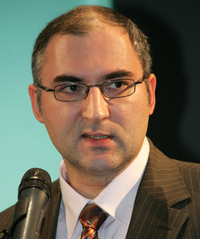University Medical Center (UMC) Mainz
Maria Felicia Basilicata Christian Behl Benedikt Berninger Luciana Berod Tobias Bopp Andreas Daiber Sven Danckwardt Carsten Deppermann Stephan Grabbe Thomas Hofmann Daniela Kramer Daniela Krause Dilja Krueger-Burg Michael Kühn Beat Lutz Johannes Mayer Wolfram Ruf Katrin Schäfer Susann Schweiger Natalia Soshnikova Tim Sparwasser Oliver Tüscher Sara Vieira-Silva Ari Waisman Philipp Wild Jennifer Winter Fatemeh Zare-ShahnehImpact of environmental risk factors on gene & protein expression and their oxidative modification for cardiovascular health

During the last two decades, studies have shown that the physical environment, such as noise from road, aircraft or railway as well as air pollution, can facilitate the development of cardiovascular and metabolic diseases. We study the influence of aircraft noise exposure on cardiovascular and metabolic function in humans and model organisms using next generation sequencing and olink technology, and have identified oxidative stress and inflammation as central players in mediating vascular dysfunction. Our ongoing studies investigate the effects of aircraft noise in individuals with cardiovascular disease, as well as (non-) pharmacological mitigation strategies, the effects of particulate matter from air pollution on cardiovascular health, and the health effects of e-cigarette and shisha Vaping/smoking.
Positions held
- Since 2008: Professor (W2) in Molecular Cardiology, University Medical Center (UMC), Mainz
- Since 2006: Head of Molecular Cardiology, University Medical Center (UMC), Mainz
- 2000 - 2006: Postdoc, University of Konstanz and Exp. Cardiology, University Hospital Hamburg-Eppendorf and University Medical Center (UMC), Mainz
Education
- 2000: PhD in Biological Chemistry, University of Konstanz
- 1997: Diploma in Chemistry, Biological Chemistry, University of Konstanz
Selected publications by Andreas Daiber
Münzel T, Steven S, Hahad O and Daiber A. (2020) The sixth sense is involved in noise-induced stress responses and vascular inflammation: evidence for heightened amygdalar activity in response to transport noise in man. Eur Heart J, 41(6):783-785 Link
Steven S, Dib M, Hausding M, Kashani F, Oelze M, Kröller-Schön S, Hanf A, Daub S, Roohani S, Gramlich Y, Lutgens E, Schulz E, Becker C, Lackner KJ, Kleinert H, Knosalla C, Niesler B, Wild PS, Münzel T and Daiber A (2018) CD40L controls obesity-associated vascular inflammation, oxidative stress, and endothelial dysfunction in high fat diet-treated and db/db mice. Cardiovasc Res, 114(2):312-323 Link
Steven S, Oelze M, Hanf A, Kröller-Schön S, Kashani F, Roohani S, Welschof P, Kopp M, Godtel-Armbrust U, Xia N, Li H, Schulz E, Lackner KJ, Wojnowski L, Bottari SP, Wenzel P, Mayoux E, Münzel T and Daiber A (2017) The SGLT2 inhibitor empagliflozin improves the primary diabetic complications in ZDF rats. Redox Biol, 13:370-385 Link
Steven S, Jurk K, Kopp M, Kröller-Schön S, Mikhed Y, Schwierczek K, Roohani S, Kashani F, Oelze M, Klein T, Tokalov S, Danckwardt S, Strand S, Wenzel P, Münzel T and Daiber A (2017) Glucagon-like peptide-1 receptor signalling reduces microvascular thrombosis, nitro-oxidative stress and platelet activation in endotoxaemic mice. British journal of pharmacology, 174:1620-1632 Link
Münzel T, Gori T, Keaney JF Jr, Maack C and Daiber A (2015) Pathophysiological role of oxidative stress in systolic and diastolic heart failure and its therapeutic implications. Eur Heart J, 36(38):2555-64 Link